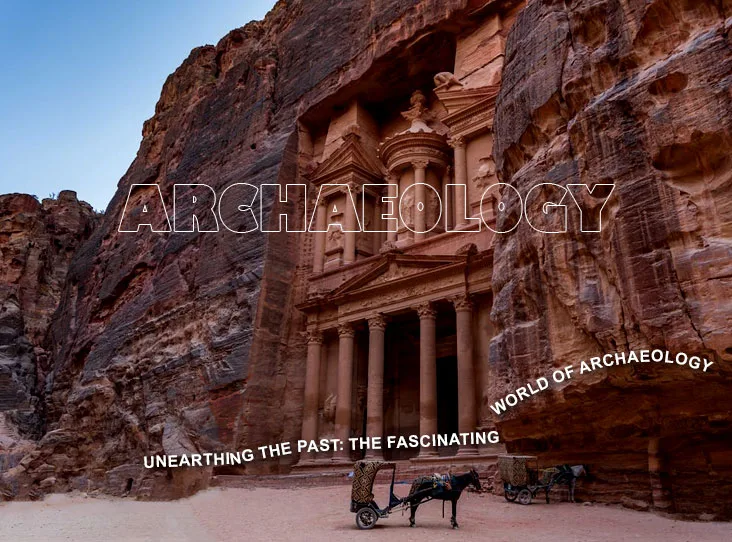Table of Contents
Unearthing the Past: The Fascinating World of Archaeology
Archaeology, the science of delving into the depths of history to uncover the secrets of our ancestors, has captivated the human imagination for centuries. The very word “archaeology” conjures images of intrepid explorers painstakingly excavating ancient ruins, unearthing long-forgotten civilizations and buried treasures. But this field is far more than a treasure hunt; it is a rigorous discipline that sheds light on the complex tapestry of human history and offers invaluable insights into our past.
What is Archaeology?
At its core, archaeology is the scientific study of human history through the recovery and analysis of material culture. This material culture includes artifacts, structures, and other physical remains that provide evidence of past societies and their activities. Archaeologists employ a wide range of tools and techniques to interpret and reconstruct the past. This multidisciplinary approach incorporates elements of anthropology, geology, chemistry, biology, and more.
The Archaeologist’s Toolkit
Archaeologists use a variety of tools and methods to uncover and understand the past. Excavation is perhaps the most iconic of these methods. It involves carefully digging into the earth to reveal layers of soil, artifacts, and structures. Each layer, or stratum, can provide valuable information about different time periods and the events that occurred during them.
Another crucial tool is radiocarbon dating, which allows researchers to determine the age of organic materials by measuring the decay of radioactive carbon isotopes. This method is essential for establishing chronologies and understanding the temporal sequence of archaeological finds.
In addition to these traditional methods, modern archaeology benefits from advanced technology. Ground-penetrating radar, LiDAR (Light Detection and Ranging), and satellite imaging have all revolutionized the field, enabling archaeologists to uncover hidden features without disturbing the earth. Furthermore, high-resolution 3D scanning and imaging techniques allow for detailed analysis of artifacts and structures.
The Quest for Knowledge
The primary goal of archaeology is to reconstruct and understand the human past. This journey through time takes us to a multitude of different sites and cultures, including ancient cities, burial grounds, shipwrecks, and more. While some archaeological projects may focus on a single site, others investigate entire regions, creating a comprehensive picture of how past societies lived, thrived, and sometimes disappeared.
One of the most famous archaeological sites in the world is the ancient city of Pompeii, which was preserved by the eruption of Mount Vesuvius in 79 AD. The ongoing excavations of Pompeii have provided remarkable insights into daily life in a Roman city, including its architecture, art, and even preserved food. These findings allow us to glimpse the lives of those who perished in the cataclysmic eruption.
Preserving Our Heritage
In addition to uncovering the past, archaeology plays a vital role in the preservation of our cultural heritage. By meticulously documenting and conserving artifacts and sites, we ensure that future generations can continue to learn from our shared history. The past is a non-renewable resource, and it is our duty to protect and study it for the benefit of all.
Ethical Challenges
Archaeology isn’t without its ethical challenges. The field has been criticized for its colonial and exploitative history, with many artifacts being removed from their countries of origin and placed in museums far from their cultural context. In recent years, there has been a growing emphasis on repatriation and respectful collaboration with indigenous communities, striving to ensure that archaeology is more inclusive and culturally sensitive.
The Future of Archaeology
The future of archaeology is as exciting as its past. Advances in technology and increased global collaboration promise to open new frontiers in our understanding of history. With the development of non-invasive techniques, the protection of archaeological sites, and the inclusion of diverse perspectives, archaeology is evolving into a more inclusive, ethical, and vibrant field.
Conclusion
Archaeology stands as a testament to humanity’s innate curiosity and thirst for knowledge about our origins. It allows us to connect with our ancestors, to explore the mysteries of bygone civilizations, and to appreciate the rich tapestry of our shared history. It’s a journey that continues to inspire and illuminate, reminding us that the past is not a foreign country but a part of the ever-evolving story of our world.
Author
Stay connected for new publications, events, and more.







More Stories
Field of Study: Cloud Computing
Field of Study: Anthropology
Field of study: Respiratory Therapy